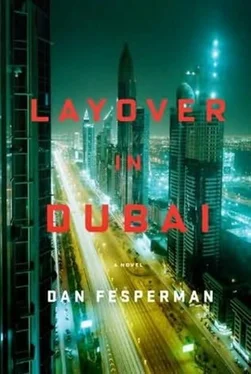With a lesser adversary Sharaf would have continued to play dumb. Using that approach with her seemed foolhardy, even dangerous. It wasn’t just that she represented a powerful corporation (although he knew that would have been sufficient grounds for the Minister), it was that he detected in her a keen and watchful intelligence, plus the patience to deploy it to maximum effect. What’s more, she seemed willing to use it toward any end, an advantage he would never enjoy.
In addition, her manner was so convincing that for a moment he even entertained the thought that she might be telling the truth. After all, how much did he actually know about Sam Keller? Could the young man really be trusted? Maybe he had attacked this woman. Maybe he had cooperated with the men who’d killed Charlie Hatcher. Perhaps Nanette Weaver had information that could help him.
But by then, Nanette Weaver had already turned on her heel and was heading for the door. Sharaf was on the verge of flagging her down when he noticed Assad watching eagerly from his office, and that was when he came to his senses. Assad’s stupid, leering grin gave away the whole sham, and Sharaf realized he had nearly been duped. A compliment to her talents, he supposed.
“So you’ve seen firsthand what she’s like,” Sam said. “All the more reason you need my help.”
“I cannot allow it,” Sharaf repeated. “If I put you at further risk we will both be in trouble. You are neither trained in this kind of work nor accustomed to its dangers.”
“But I’m stuck here. With nowhere to go and no one to help me.”
The remark cut deeply. There was no way Sam could have known it, but it was a direct echo from Sharaf’s bedtime reading of Crime and Punishment the night before, calling to mind a line uttered by a desperate drunk named Marmeladov:
“Do you understand, sir, do you understand what it means when you have absolutely nowhere to turn?”
As if sensing an opening, Sam pressed his case.
“You’re forgetting that I’m an auditor. I’m trained to look for things that don’t fit. Outliers, anomalies. Particularly on the corporate side, which is Nanette’s strength.”
“Maybe so,” Sharaf said. “But first we must find you safer quarters. For my sake as well as yours. Fortunately I know the very man who can help, and I am due to see him in the morning.”
“Good enough,” Sam said. “Count me in.”
“Then we had better get going, before one of us changes his mind.”
By the time Sharaf arrived at his favorite old haunt, Ali al-Futtaim had already selected seven dominoes and placed them in his wooden rack, ready for action. But Sharaf was in no mood for a game.
“Leave your tiles in the boneyard, Ali. No time for that this morning. A life is at stake.”
“Someone in your family?”
“Someone under my protection. A foreigner.”
Ali showed his disapproval by taking a domino from the rack and slapping it into play, a double-six that clicked loudly on the cool ceramic floor.
“No foreigner takes precedence over our game,” he said. “Especially when you now trail me by three hundred dirhams. Choose your bones and make a move.”
“Two hundred ninety dirhams, to be exact,” Sharaf said. He placed a forefinger on the lonely tile and shoved it toward Ali, like a tugboat nudging a premature departure back into the docks. He sipped the muddy coffee that had just been delivered by a young waiter, the boy knowing without asking that Sharaf liked his medium with a single sugar.
“Seriously, Ali. There are urgent matters to discuss. I need your wisdom.”
“My connections, you mean?”
“Is there a difference?”
Both men smiled, as they always did at such remarks. Ali motioned to the boy for tea, and he didn’t put his tile back into play.
They were seated cross-legged on the floor at their usual spot at the Seaman’s Majlis, or meeting place, which was located in a once fine home with thick plastered walls, a rooftop parapet, and a crumbling wind tower along the banks of Dubai Creek. It was just around the bend from the wharf where, as boys, Ali and Sharaf had put to sea for pearling and smuggling. Like everyone there, they came for fellowship and conversation, removing their shoes at the door and hunkering down on rugs and cushions for card games and dominoes, while waiters delivered tea and coffee on trays of hammered brass.
It was not a young crowd. Retirees, mostly. Old men whose skin had been stropped to leathery darkness by salt and sun. Sharaf’s single year of seagoing experience only marginally qualified him for admission, although no one would have begrudged the presence of a policeman. The warmth of his welcome had far more to do with the status of his friend. Ali had spent seven years on the water, commanding a smuggler’s boat during his final season-a big twin-engine sanbouk of varnished teak, owned by Sharaf’s father-back in the day when an illicit load of gold hidden in a cargo of dates turned a handsome profit in the port of Bombay. Sure, you might get caught by the Indian authorities, but as long as your own ruler viewed smuggling as business as usual, the only danger on the home front was that some waterfront snitch would report your departure to an Indian spy. That was how Ali, as a seventeen-year-old deckhand, once ended up having to swim ashore in Bombay after his ship was boarded by customs police. He then spent a week making his way cross-country and into Pakistan, where he finally boarded a cargo flight home from Karachi.
Such resourcefulness was perfect training for his current job as manager of the Dubai Land Office. When he first joined up, the land office was a sleepy outpost where locals went to mark off plots for homes or dispute neighbors’ claims to a few scraggly date palms. Now it was the bustling nexus of Dubai’s most lucrative commerce. Builders, developers, financiers, and con artists of all nations flocked there to stake claims on the latest slice of boomtown wealth.
The work obviously agreed with him. Ali was trim and relaxed, looking younger than Sharaf even though he was two years older. He carried himself elegantly in a long white kandoura , which made Sharaf feel frumpier than usual in his police greens. As if to soften the contrast, Sharaf always removed his beret when he met Ali at the majlis. It was also a signal to everyone in attendance that the cop was off duty, no matter what anyone there might say or do. What happened at the majlis stayed at the majlis.
They met there once a week. Ali had always preferred this location over the better-known Fisherman’s Majlis on the beach in Umm Suqeim. For one thing, no one minded that he and Sharaf made taboo wagers on their dominoes. It was a carryover from deckhand days, when Ali taught Sharaf how to gamble against gold runners three times their age.
Their meetings were often occasions for swapping favors in the local tradition of wasta . Ali sometimes needed help tidying up minor police matters for his moneyed contacts. To keep his own hands relatively clean, Sharaf always referred Ali to one of the Syrian or Egyptian cops with a reputation for reasonable prices. He had the good sense never to ask later about results, and Ali had the manners never to mention them.
In return, Sharaf sometimes availed himself of aid or information from Ali’s vast network of developers, bankers, and builders. And at the moment he needed Ali’s help in keeping Sam Keller out of harm’s way. So he described his predicament, and even mentioned his recent secret correspondences with the Minister, whom Ali had also assisted on a few occasions.
“And the Minister?” Ali said. “You say he does not know you are hiding this fugitive?”
Читать дальше












